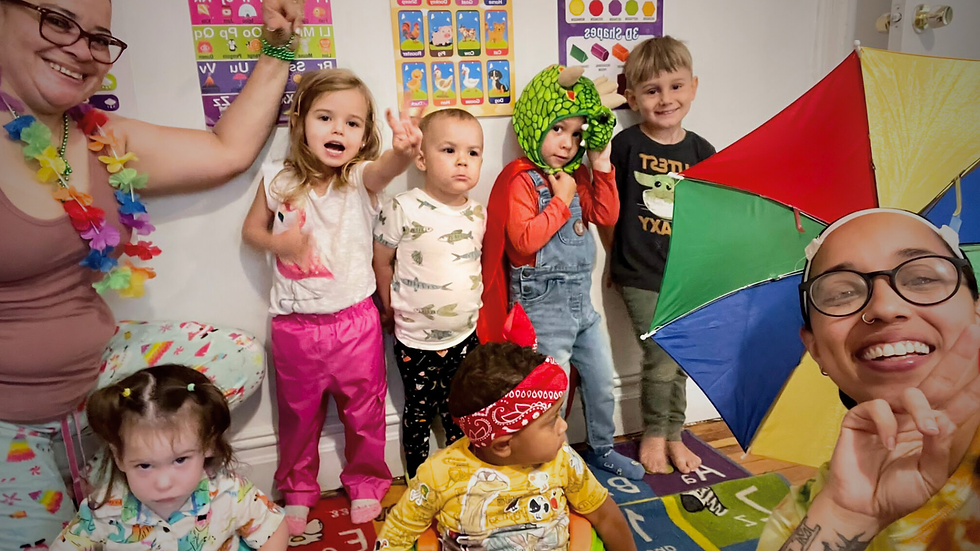Preparing Your Child for Daycare: A Parent’s Guide
- B & J Wonderland Day Care
- Apr 21, 2025
- 3 min read

Starting daycare is a big transition for both children and parents. It’s natural for parents to
have concerns about how their child will adjust, and for children, it can be a challenging
change. However, with the right preparation, the transition to daycare can be smooth and
stress-free. In this guide, we’ll explore how to prepare your child for daycare, what age is
most challenging for daycare starts, and how long it typically takes a child to adjust.
1. How to Prepare Your Child for Daycare?
Preparation is key to helping your child feel comfortable and secure in a daycare
environment. Here are some strategies to ensure a smooth transition:
Talk About Daycare in a Positive Light: Before starting, discuss daycare with your
child in a positive and enthusiastic way. Explain the fun activities they will participate
in, the new friends they will make, and the kind, caring teachers who will be there to
help.
Visit the Daycare Together: Take your child for a visit before their first day. Introduce
them to the teachers, show them the toys and play areas, and let them explore.
Familiarity with the daycare setting can reduce fear and anxiety.
Establish a Goodbye Routine: Develop a consistent and comforting goodbye routine
for drop-offs. A special wave, a hug, and reassuring words like, "Mommy/Daddy will be
back after lunch!" can help your child feel secure.
Practice Separation: If your child hasn’t been away from you for long periods,
consider practicing separation with short times apart. Leave them with a trusted
friend or family member for brief periods to help them get used to the idea of being
away from you.
2. What is the Hardest Age to Start Daycare?
The hardest age to start daycare varies for each child, but generally, infants between 6
months and 18 months tend to experience more difficulties with separation. At this age,
children are becoming more attached to their primary caregivers and may struggle to
understand why they are being left at daycare.
Toddlers and preschool-aged children may also face challenges, but they are often more
adaptable, especially if they’ve already had some experience with other social settings
like playdates or group activities.
While the transition may be tough, it’s important to remember that with time, children
generally adjust to daycare routines and environments. The key is to provide comfort,
consistency, and positive reinforcement throughout the process.

3. How to Prepare Children for Daycare?
To help children feel more prepared for daycare, you can take the following steps:
Use Comfort Items: Allow your child to bring a favorite toy or blanket to daycare.
Familiar items can provide comfort and reassurance during moments of distress.
Start with Short Days: If possible, begin with shorter hours at daycare and gradually
increase the time as your child adjusts. This can help ease the transition and build
trust with the daycare provider.
Maintain Consistency: Children thrive on routine. Try to establish a consistent daily
schedule at home leading up to daycare, including waking up, mealtimes, naps, and
bedtime. A predictable routine will help them feel more secure in an unfamiliar
environment.
Stay Calm and Positive: Children can pick up on their parents’ emotions, so if you stay
calm and confident, your child is more likely to feel comfortable. Express excitement
about their new daycare adventure and reassure them that you’ll be back at the end
of the day.
4. How Long Does It Take a Child to Adjust to Daycare?
Every child adjusts to daycare at their own pace. Some children adapt within a few days,
while others may take several weeks. On average, it can take anywhere from two weeks to
a month for children to feel fully comfortable and secure in a new daycare setting.
During the adjustment period, it's normal for children to experience some separation
anxiety, especially at drop-off times. With patience and consistent routines, most children
eventually grow to enjoy their time at daycare, building relationships with their peers and
caregivers.

Flexible Care Options for Parents
For parents who need flexible childcare options, BandJ Daycare’s Drop-In Care Program
offers a convenient and supportive solution. Whether you need occasional care or a more consistent schedule, this program provides a flexible option to meet the unique needs of your family.






Comments